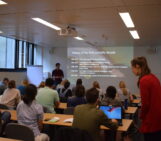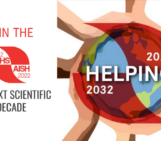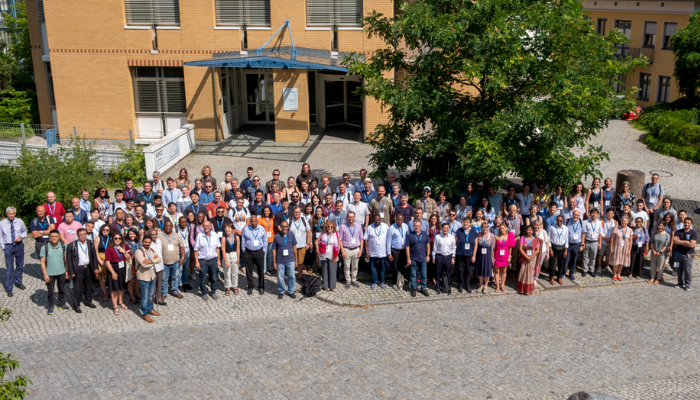
On the 10th and 11th of July 2023, the final symposium for the scientific decade “Panta Rhei – Everything Flows: Change in Hydrology and Society” of the International Association of Hydrological Sciences (IAHS) took place at the German Research Centre for Geosciences (GFZ) in Potsdam.
During these two days, 150 hydrologists, engineers, social scientists and practitioners from 32 countries gathered in Potsdam to reflect on and celebrate the progress made in the past ten years. Plus, some remaining issues were identified and aspects which should be addressed in the new, upcoming scientific decade – HELPING – were outlined.
What are IAHS Scientific Decades?
The aim of the scientific decades organised by IAHS is to accumulate and accelerate scientific knowledge and understanding of a specific hydrological problem or phenomena through collaborative forces. Setting a global research agenda can encourage coherent engagement and therefore streamline the efforts towards the respective topic.
Panta Rhei was the second scientific decade coordinated by the IAHS. It was preceded by a decade on “Predictions in Ungauged Basins (PUB)”, which lasted from 2003 to 2012.
The approach has proven to be successful for two decades now and so the efforts do not stop here: “The Panta Rhei decade came to an end, but the vibrant, active community will continue to work together in other IAHS activities like the new decade ‘Science for solutions: Hydrology Engaging Local People IN one Global world (HELPING)’”, says Heidi Kreibich, chair of the Panta Rhei initiative from 2021 to 2023.
What did the Panta Rhei decade achieve?
The focus of the Panta Rhei decade was the study of interactions and feedbacks between hydrology and society. The more than 500 members of the initiative focused on processes and drivers of change in the hydrological systems while also putting a strong emphasis on interactions with the changing social system.
Their work throughout the decade showed that long-term developments such as feedbacks between natural and socio-economic processes need to be understood better. If we fail to take such developments and feedbacks into account, human interventions can lead to unintended, negative consequences.
Researchers involved in Panta Rhei also found that flood and drought risk management need to adopt a longer-term complex system view rather than focusing on short-term risk reduction.
Other important findings regard the design and implementation of research studies: firstly, justice and equity need to be considered in these processes, and secondly, involving stakeholders through a participatory approach adds relevant detail and legitimacy.
In addition, the scientific decade fostered international collaborations and discussions. One important outcome of Panta Rhei was to highlight the potential for learning from similar water problems in different places around the world.
These main findings, along with a synthesis of all the work done throughout the Panta Rhei decade, are compiled in the synthesis book “Coevolution and Prediction of Coupled Human-Water Systems”. The book was launched by Fuqiang Tian (Professor at Tsinghua University, China) during the symposium and is expected to be published – online and open access – by the end of this year.
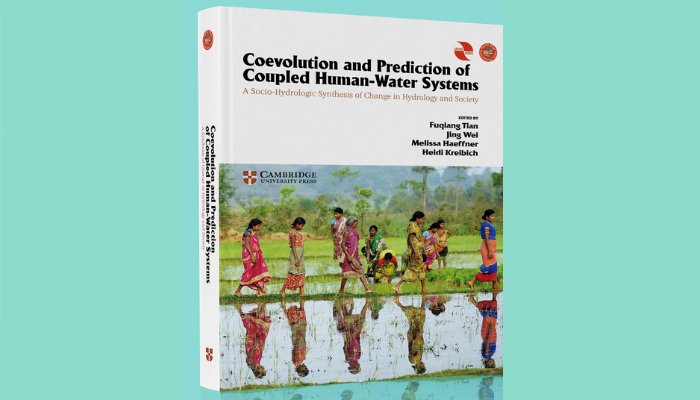
The synthesis book of the Panta Rhei decade, which was launched during the symposium in Potsdam. It is expected to be publicly available by the end of this year.
The Final Panta Rhei Symposium
This brings us back to Potsdam – and to the final Panta Rhei symposium.
The opening lecture was inspiring: Johan Rockström (Director of the Potsdam Institute for Climate Impact Research, Germany) gave a talk on planetary boundaries and water as a common good.
The two keynote speakers on the second day wonderfully complemented each other by each addressing one of the main aspects of the Panta Rhei decade. Manuela Brunner (Professor at ETH Zurich, Switzerland) gave insights on change in hydrology through presenting climate and reservoir influences on droughts, floods, and their transitions. In contrast, Joerg Niewoehner (Director of the Integrative Research Institute on Transformations of Human-Environment Systems (IRI THESys), Germany) focussed on societal aspects in his talk on understanding water through integration and agonism.
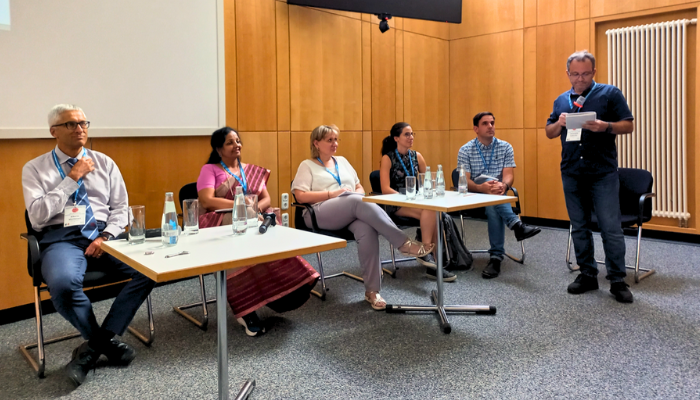
Panellists from around the world discuss remaining gaps and future research. From left to right: Alberto Montanari, Archana Sarkar, Valeriya Ovcharuk, Mariana de Brito, Pedro Chaffe and moderator Christophe Cudennec. Photo: Heidi Kreibich, GFZ.
Another highlight in the programme were the two panel discussions. During these, panellists from around the world elaborated on the transfer of results from Panta Rhei to practise, as well as on remaining gaps and future research. In addition, more than 40 young scientists had the opportunity to present their work in flashlight talks and posters.
The lively discussions continued during a summerly rooftop barbecue on the first evening.
On the second day, the programme was closed with a visionary outlook by Günter Blöschl (Professor at TU Wien, Austria, and Past-President of IAHS). And with that the Panta Rhei decade came to an end – making room for the new scientific decade HELPING which was launched just a few days later in Berlin.
Edited by Christina Orieschnig

